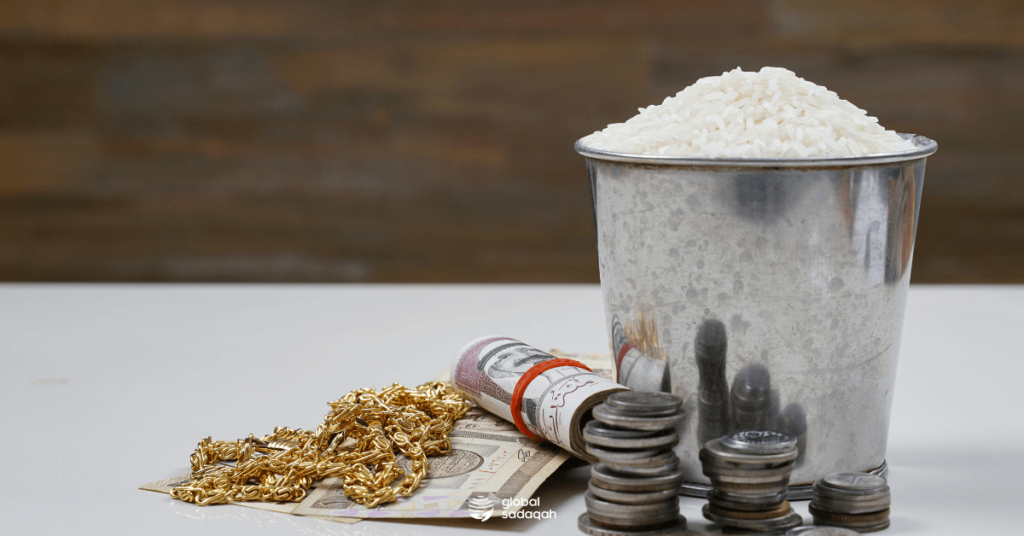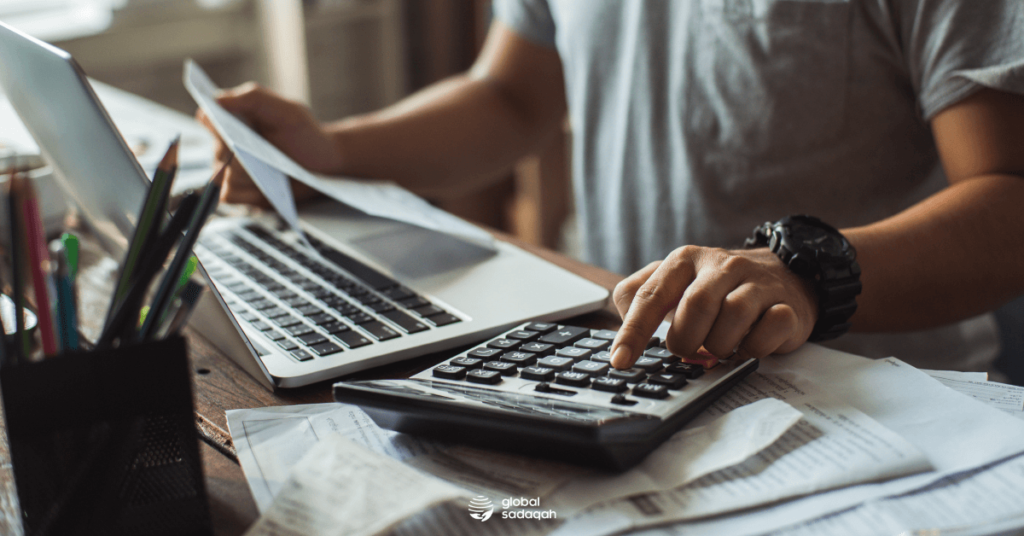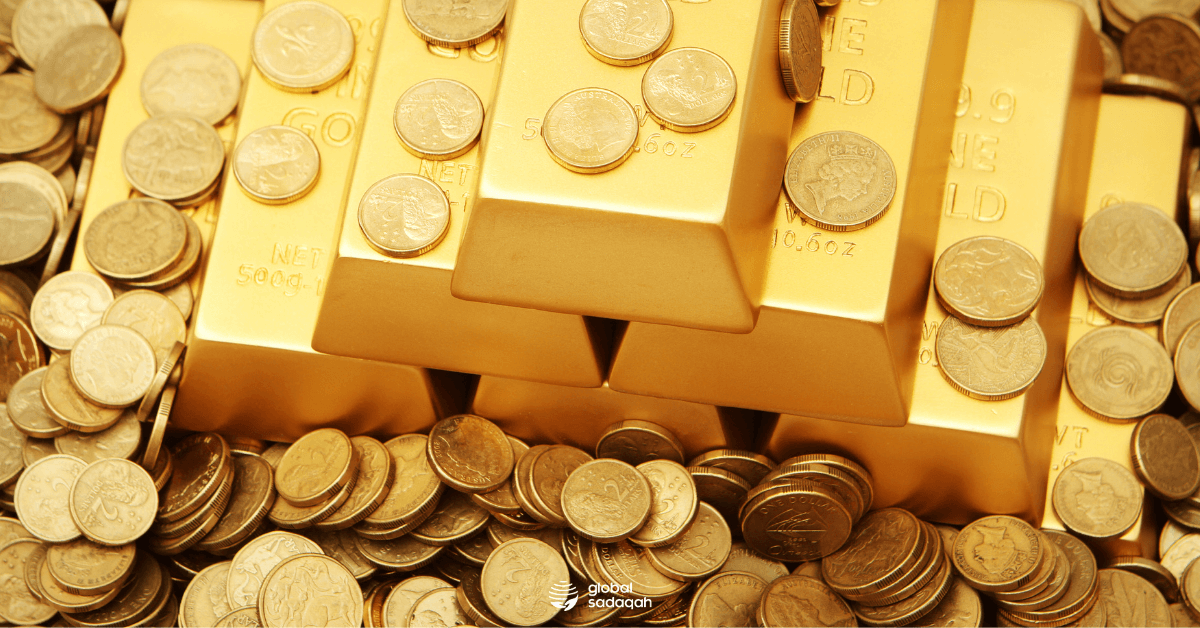Giving out zakat is an obligation for all eligible Muslims. But admittedly, formulating how much you need to pay for your zakat can be confusing. Hence, we came up with this mini guide to help you navigate the different facets of paying your zakat.
But before we dive right in, it’s always good to remind ourselves that just by sitting to calculate our zakat, one is also engaging in an act of worship in and of itself.
Who is eligible to pay zakat?
- Muslim of sound mind
- Free (Not enslaved)
- In control of their own wealth
- Has reached the minimum threshold for zakat (known as nisab)
- A full lunar year has passed over the zakatable wealth
Zakat starts on the date your wealth first equaled or exceeded the nisab and should be calculated on that date for each subsequent year.
The Prophet (ﷺ) sent Mu’adh to Yemen and said, “Invite the people to testify that none has the right to be worshipped but Allah and I am Allah’s Messenger (ﷺ), and if they obey you to do so, then teach them that Allah has enjoined on them five prayers in every day and night (in twenty-four hours), and if they obey you to do so, then teach them that Allah has made it obligatory for them to pay the Zakat from their property and it is to be taken from the wealthy among them and given to the poor.” [Bukhari]
This hadith clearly shows us that zakat is obligatory on the rich irrespective of the individual’s age – showing that sanity and puberty are also not required conditions unlike so many other acts of worship.
More importantly, many narrations emphasize the importance of paying zakat, designating it as the right of the poor, and that one should fulfill their zakat irrespective of the condition of the person holding the wealth.
For example, it is still the responsibility of the parents or the guardians to, on their behalf, calculate and disburse the zakat of a child or a mentally incapable person who has wealth.
The husband can also pay the zakat on behalf of his wife. Similarly, if a person dies while owing zakat, that amount will be deducted from his estate.
Several parts of the hadith explain why it is necessary for a father or the guardian to pay the zakat on behalf of the children.
Narrated ‘Abdullah bin Umar: The Messenger of Allah (ﷺ) as saying: “Each of you is a shepherd and each of you is responsible for his flock. The Amir (ruler) who is over the people is a shepherd and is responsible for his flock; a man is a shepherd in charge of the inhabitants of his household and he is responsible for his flock; a woman is a shepherdess in charge of her husband’s house and children, and she is responsible for them; and a man’s slave is a shepherd in charge of his master’s property and he is responsible for it. So, each of you is a shepherd and each of you is responsible for his flock.
Another important hadith that highlights the role of the guardian is: ‘Amr bin Shu’aib narrated on the authority of his father who reported on the authority of his grandfather, on the authority of Abdullah bin ‘Amr that the Messenger of Allah (ﷺ) said: “One who becomes the guardian of an orphan, who owns property, must trade on his behalf and not leave it (saved and unused) until it is all eaten up by zakah (which is paid yearly).” [Tirmidhi]
Conditions of Zakat
Zakat becomes obligatory when it meets certain conditions pertaining to wealth, as summarized by Sheikh Joe Bradford, an American scholar of Islam.
- Unhindered private ownership of the wealth
- It has an expected multiplied benefit and utility
- It has reached the nisab
- It is surplus wealth: i.e., beyond principal needs
- It is not encumbered by debt
What is nisab and how is it calculated?
Nisab (plural: Nusub) is considered a certain financial threshold. It is described as the minimum amount of wealth that a Muslim must own before zakat is obligated upon them.
Pegged to the value of gold, the nisab value changes every year. The value of nisab is determined by the local Islamic council based on the average value of the price of 85g of gold in the past year. Muslims whose wealth or net assets have reached this threshold are obliged to pay Zakat, which is 2.5% of the total value of the wealth which has been in their possession for more than one lunar calendar year.
What is the reason behind 2.5%?
This threshold was stipulated by the Messenger of Allah. The calculation is based on 20 mithqal of gold which is equivalent to 85-87 grams of gold or 200 dirhams of silver which is equivalent to 595 grams of silver.
Ali narrated that the Messenger of Allah (ﷺ) said: “When you possess two hundred Dirhams at the end of the year (if you still have all of them), five Dirhams are levied on them as Zakat. There is nothing upon you (to be paid) in gold, until it reaches (the value of) twenty Dinars. When you possess twenty Dinars, at the end of the year, then there is half a Dinar levied on it (as Zakat). Any additional amount will be calculated in the same manner. No Zakat is to be paid on monetary holdings, until they have been owned for one year.” [Abu Dawud]
If you possess 200 dirhams till one-year passes, five dirhams are payable as zakat. (2.5%) and if you possess 20 dinars till one-year passes, half a dinar is payable as zakat. Based on these learnings, zakat is not necessary for someone if they possess less than 595 grams of silver, less than five camels, or less than 652.8 kilograms of dates and grains.
1 Dinar: 4.245 grams of gold.
20 Dinars: 85 grams of gold
Zakat is calculated by multiplying the price of 1 gram of pure (24k) gold by 85.
1 Dirham 2.975 grams of silver.
200 Dirhams: 595 grams
This was the most prevalent form of currency at the time of the Prophet and Arabia in general.
Though the world’s currency system has changed drastically since the Prophet’s time, dinars and dirhams can still be found in museums across the world; with many dating all the way back from the time of Abd al-Malik ibn Marwan who minted the first standardized currency.
To standardize zakat calculation, scholars in recent times have taken the median weight of the different coins that were preserved and concluded that based on this, the nisab for silver is 595 grams. This method was the ruling adopted by AAOIFI (Accounting and Auditing Organization for Islamic Financial Institutions) which produces standards for Islamic financial institutions.
Because most our assets are a mix of gold, cash, properties, stocks etc., the standard that has been used by Muslims today is based on the price of silver, rather than gold, as we strive to hold ourselves to a higher level of excellence.
As per Imam Ahmad and Imam Abu Hanifah’s madhab, one can calculate their nisab according to the value of lesser of the two elements (gold or silver) because that is more beneficial for the poor and it implements a pillar of Islam.
This direction is the preference and reasoning of Sheikh Dr. Yusuf al-Qaradawi as well, according to his book, ‘The Fiqh of Zakat’.
Giving more via zakat is also one way for a person to develop a higher social conscience. When more people in the community engage in the payment of zakat, it will hopefully create more conversations and curiosity over it – there will be more questions on how zakat is managed and raise as well as how it helps the beneficiaries.
A very important point to remember while calculating your zakat is that it is an individual assessment, not combined with the wealth of one’s family.
When to pay zakat?
Before answering this question, two important things must be considered first: which are the al-Hawl and meeting the nisab.
What is al-Hawl? As per the famous dictionary, Lisan Al-Arab, a year (‘Aam) is considered Al-Hawl when it arrives in winter and summer; its plural is A’wam. Essentially, Al-Hawl it is the period of one lunar year that must pass over a certain amount of wealth at the end, of which then zakat becomes due upon it.
Ibn Umar narrated, ‘Whoever earns any money, he is not liable to pay zakat, until the period of a year has passed (while still possessing the same amount of money).’ [Tirmidhi]
The condition of the passage of one lunar year is restricted to money, livestock, and business assets. It does not include agricultural products, fruits, honey, extracted minerals and treasure that is found, as the latter are subject to zakat at the time of harvest or when discovered.
A person must begin calculating their zakat from the time their wealth hits the nisab because on the same date the following year, their zakat is then due.
If during the year, one’s overall wealth falls below the nisab, then everything is reset, and one must restart their calculation once more from when the date when they reached the nisab value.
Protip: to better track your hawl, make sure that a specific date has been selected and recorded. When one lunar year has passed over one’s wealth, which hits the nisab, then that is known as hawl.
Zakat needs to be paid as soon as the lunar year is completed. However, the price may change based on any fluctuations in the year. Thus, why knowing and recording your zakat due date is so important.
Another easier way to pay zakat is to sum all the zakatable assets that one has on the day that their zakat is due and to pay it accordingly. This method is much easier than tracking the hawl on different streams of income etc.
A common error that many Muslims make is waiting and delaying the payment of their zakat till Ramadan, mistakenly believing that they will get more rewards because it is completed during the holy month. However, this is a misconception.
The only exception to this rule is when a person has completely forgotten when their wealth has reached nisab. It is failures such as this that leads to people coming up with dates that are arbitrary.
In historical Islam, even the pious predecessors gave their zakat in Shaban instead of Ramadan as they wanted to clear any dues and obligations. As a form of generosity and dedication to Allah, any offering given in Ramadan is on top of the basic zakat.
Mufti Sheikh Dr.Sajid Umar made a very interesting observation in this regard. He said, “Zakat is paid based on a year passing upon the Lunar calendar. If one works out their zakat as based on the solar calendar, they pay 2.577% of the value of their zakatable assets that fall under the 2.5% category. Allah knows best.” This is the position of AAOIIFI as well.
When should you pay your zakat?
When one lunar year passes on money, cattle, and trading commodities provided they meet the nisab
When grains become hard and the signs indicating ripeness appear with regards to fruits
Zakat is paid on honey when it meets the nisab
Zakat is paid on minerals when they are mined and meet the nisab
These will all be discussed in the coming sections
As Muslims, as much as we can, we should not delay paying zakat as our money is considered the right of the poor channeled through us by Allah – or in other words, money that was never ours to begin with.
Our 2.5% is someone’s 100%. Allah tells us, “In their wealth and properties is the right of the poor, the beggar and he who is in deprivation.” [Surah al-Dhariyat, 19]
To sum, time is of vital importance. Delaying the payment of zakat can destroy us in both the dunya and in the hereafter.
The Messenger of Allah ﷺ said: “He who is given wealth by Allah but he does not pay its Zakat, that wealth is made for him, on the Day of Judgment, into the form of a huge bald serpent with two horns, encircling that person and squeezing him all day, then holding him by lips telling him, ‘I am your wealth, your treasure that you hoarded.”
Then the Prophet ﷺ quoted the verse, “And let not those who covetously withhold the gift that Allah has given them of His grace think that it is good for them. Nay, it will be worse for them. Soon shall the things which they covetously withheld be tied to their necks like a collar on the Day of Judgment.”(Surah Al-Imran, 180) [Bukhari]
The Prophet ﷺ said: “Zakat is never intermingled with any amount of wealth without destroying and rotting it.”
As per Imam al-Mundhiri, this hadith has two potential meanings. First, that whenever due Zakat is not paid it will cause harm to one’s wealth. “Whenever any amount of wealth is destroyed in the land or in the sea it could be because its zakat was not paid.” [Tabarani]. Secondly, if a person who takes zakat as a recipient without deserving that zakat and mixes it with his wealth, it will be a reason for rotting all his wealth. [Ahmad]
If a person has been neglectful and not paid zakat for many years, then he is obligated to seek forgiveness from Allah and to quickly pay the zakat that is due for all those years.
Though it takes knowledge and the understanding of zakat payment to be able to perform it property, ignorance should not be taken as an excuse because paying zakat is a pillar of Islam, like the five daily prayers,
Remember: zakat is like a trust in the hands of the donor and is the due right of the beneficiary.

Can you pay zakat early?
It is permissible to pay zakat early as per the majority opinion of the scholars, but it is better to be paid in its due time unless there is an immediate reason to do so. Zakat can be paid up to two years in advance provided the nisab is met.
Ali narrated, “Al-Abbas asked the Messenger of Allah about paying his charity (zakat) in advance before its time is due (by being in possession for a whole year), he permitted him to do that.” [Tirmidhi]
Sheikh al-Islam Ibn Taymiyyah also said: “As for paying zakat before it is due, that is permissible according to the majority of scholars, such as Abu Hanifah, al-Shafi’i and Ahmad, and it is permissible to pay zakat in advance on livestock and gold and silver, and trade goods, if he owns the nisaab (minimum threshold). [Majmu’ al-Fatawa]
Based on these lessons, we believe that a person can fulfill their zakat monthly as well. Muslims who pay more than the minimum for their zakat will be reward by Allah for it. If it is less than the amount that due, then that remaining difference can be topped off.
Scholar Sheikh Ibrahim Nuhu said, “Based on the hadith where we read that the Prophet ﷺ said he would pay zakat on behalf of Abbas, we learn that another person can pay zakat on behalf of another person provided that they have been informed and they have consented. The point is that the money has to be paid on that which a year has passed, or it has reached the nisab. This is irrespective of where or from whom the money comes from.”
Saudi Scholar Sheikh Ibn al-Uthaymeen said, “Paying zakat more than a year in advance is valid, but it is only permissible for a few years, and it is not permissible for more than that. But one should not pay zakat in advance unless it is in response to a need such as a severe famine or jihad and the like. In that case we say that it should be paid in advance, because there may be reason to make what is ordinarily less appropriate more appropriate, otherwise it is better not to pay zakat until it becomes due, because something could happen to his wealth of destruction and the like. Whatever the case, it should be noted that if he subsequently has more than he had when he paid in advance, zakaah must be paid on the additional amount. [Fataawa al-Shaykh al-‘Uthaymeen]
Important: Zakat must be paid on all the money that is considered capital and profits when one year has passed from the time when the capital was acquired and reached the nisab.
How to calculate zakat?
Before you calculate your zakat, you must first categorize and breakdown your assets accordingly. This helps you identify whether the asset is considered zakatable because not all forms of assets are zakatable.Those that are zakatable include:
- Cash and liquid investments
- Gold and silver
- Property and similar fixed assets
- Shares, unit trusts, and equity investments
- Business assets
- Debts owed to you
2 simple ways to calculate zakah:
1. Total zakatable amount divided by 40 = Zakat 2. Total zakatable amount x 2.5% = Zakat Calculations via the lunar year are based on 2.5% and calculations via the solar calendar are based on 2.577% to accommodate the extra 11 days. Muslims in Malaysia are encouraged to make their zakat payments to the government’s zakat collection centres for proper distribution to the needy. In Malaysia, you could pay your zakat through a monthly salary deduction scheme. To avoid a clash with the monthly tax deduction (potongan cukai bulanan) for income tax, employers can make adjustments so that the monthly zakat deduction is taken from the monthly tax deduction.Here are the other methods through which you can pay zakat:
- Online through each state’s official zakat board website
- Internet banking
- MYEG
- In-person at an official zakat board branch
- Over-the-counter at the post office
- Selected bank counters or ATMs
- Official agents
Would you like to pay zakat? Check our platform to explore Zakat eligible campaigns. Through GlobalSadaqah you can help support internally displaced Afghan families to survive this deadly conflict by providing them with food, clothes, tents to sleep under.




